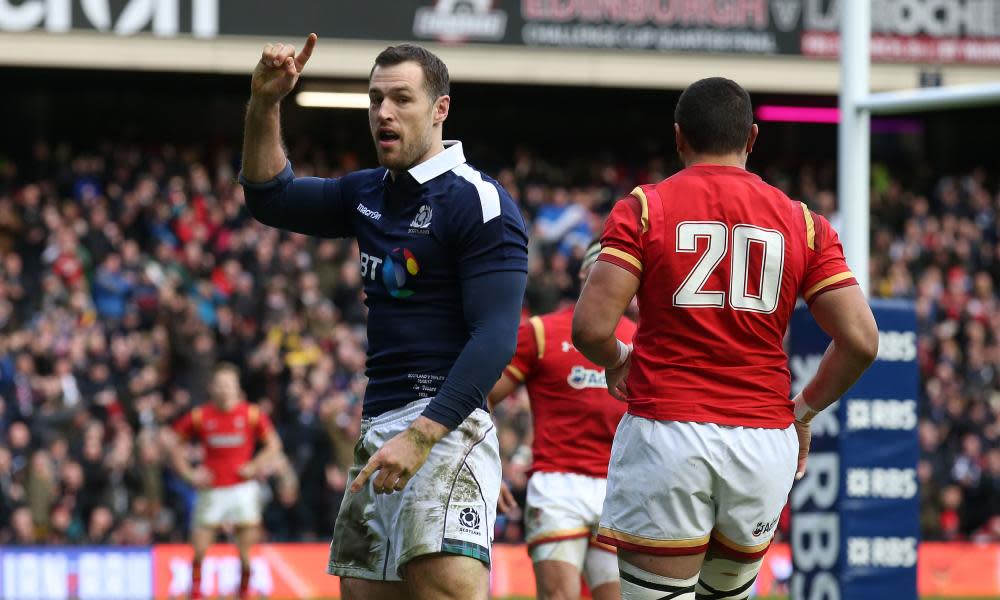Tim Visser’s heroics help Scotland end Six Nations losing streak against Wales

Another scintillating match, but, of more significance, we have incontrovertible proof now that this championship welcomes back to the fold of contenders another of its most famous names. Scotland had gone missing for a couple of decades there, but they are back, no question, and if people think England have just the one hurdle to clear for a second consecutive title they should reconsider.
In a match that went from the never-less-than-enthralling, through the exhilarating and tense, until it burst into the euphoric in the final quarter, Scotland overcame all manner of inconveniences, not the least of which was a Wales side not a whole lot shy of their best of those past couple of glory-drenched decades. In so doing, they proved themselves as inventive and witty a team, not to mention, as brave, as any who have graced the turf at Murrayfield.
They were shorn of yet another couple of crucial players, one of them their captain and goal-kicker, but Finn Russell, so long the promising maverick, took the reins with confidence, landed all his kicks from every which angle and sent player after player to the places that might hurt any defence in the world. It was a masterclass. And how his team responded.
Ten years of relentless losing against Wales has been put to an end, as was a long stretch against France only last season. Now they have the longest of all their barren runs to contemplate – the 34-years since their last victory at Twickenham. It remains a long shot, but not as long as it looked a few weeks ago, certainly a few years. Let’s face it, England have not been firing on all cylinders for a while, notwithstanding that lengthy run of their own. Scotland most definitely are.
Wales edged the first half, but they faded horribly in the second, not that it should detract from the home team’s performance. The visitors had contributed mightily to a great match, particularly in that first half.
">
The theme of a vintage Six Nations was warmed to again. It has nothing to do with bonus points - we were nowhere near one again - more to do with an unusually high coincidence of teams up here finding their form. Both sides played with confidence from the off. We had Lions auditions all round - one Alun Wyn Jones hit on Johnny Gray seemed particularly pointed - and the pleasing reassurance of each team playing as we had expected. In that first half, Wales were direct and the more physical at the breakdown, where Sam Warburton and Justin Tipuric were magnificent; Scotland the more bewitching, the running and long passing of Russell and Stuart Hogg behind the lines causing all manner of problems.
It was just a shame the first decisive blow of the game should be registered courtesy of a refereeing error. Wales held Scotland up at a maul, and John Lacey awarded them a scrum, but as it came direct from a kick the put-in should have gone Scotland’s way.
Naturally, Wales scored from it. They were awarded a free-kick, and Rhys Webb, Wales’s best player again, set his back division away. Crisp passing sent Liam Williams to the corner, exploiting an inexplicable narrowness in Scotland’s alignment. If and when Hogg is picked for the Lions this summer, it will not be for his defence. Williams beat him to the corner quite comfortably.
But, boy, Hogg can attack. His brilliance sparked the move from which Scotland pulled themselves back to 13-9 just before the break, moments after a rare miss from Leigh Halfpenny had denied Wales the chance to take a 10-point lead.
A few minutes into the second half, and that lead disappeared altogether. Richie Gray served notice of his interest in a trip to New Zealand with a mighty carry, and the puppeteers, Russell and Hogg, fed the looping Tim Visser, who put Tommy Seymour away for the corner. He made it by the skin of his teeth, and Russell’s conversion from the touchline went in off the post.
Suddenly, the force was with Scotland, all the more so when a Jonathan Davies break deep into Scotland’s 22 came to nought. How Scotland took advantage in the final quarter. They extended their lead to six points just before the hour, when Ali Price gave a convincing Webb impression with a break round the fringes, which coaxed Wales into conceding a penalty.
If there is a question mark over Scotland, though, it remains that WP Nel-less scrum. Under pressure, the ball popped out of a defensive scrum to afford Webb a chance in the corner, but a fine tackle by Visser thwarted him – just. It was not to be Wales’s day.
They held the territorial advantage across the middle of the second half, but their best efforts floundered on a Scotland defence that was now the more physical, their back row surpassing their more illustrious opponents. Hamish Watson, a first-half replacement, was everywhere, a typical, grappling, stroppy flanker in the finest of Scottish tradition. And Murrayfield was soon in euphoria.
Ryan Wilson was at the heart of a series of drives, which took Scotland to within yards of the tryline, whence a sublime cutout pass by Russell across the face of the Welsh defence drew George North in on Hogg, who slipped a try-scoring pass to Visser with little more than 10 to go. The game was all but gone, and when Russell extended the lead to 16 with five to go it was on its way back into Edinburgh.
This place has rocked in the past 17 years in celebration of a mugging by the underdog, but now it does it for what looks like real pedigree. It may be a season or two too soon to talk of titles, but at least we can say we have a proper Scotland team back.

 Yahoo News
Yahoo News 
